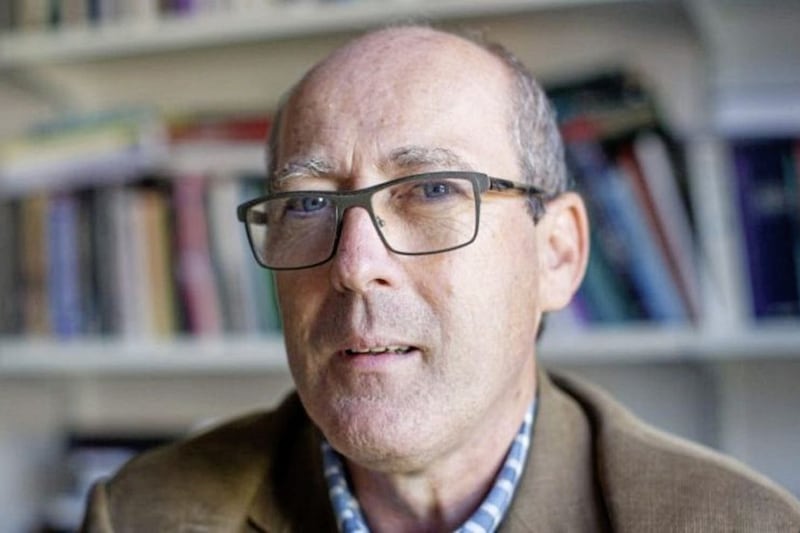Some years ago Irish comedian Ed Byrne did a classic skit about Canadian singer/songwriter Alanis Morissette and her hit song Ironic. He pointed out that all the things brought up in the song- ‘like rain on your wedding day’ or ‘a traffic jam when you’re already late’, weren’t in fact ironic. They were just unfortunate.
In fact the only ironic thing about the song was that it was called Ironic and written by someone who didn’t know what irony was.
Alanis might have been better served writing a song about Northern Ireland, where irony has seeped into our political DNA since the partition of Ireland in 1921 and remains indelibly marked on the fragile peace that we enjoy today.
While unionists loathed the idea of Home Rule at the start of the 20th century, that is essentially what they ended up with when Ireland was partitioned in 1921 –much to Sir Edward Carson’s disappointment. A relatively arbitrary line was drawn across Ulster, with six of its nine counties sequestered into the newly created Northern Ireland. It was everyone’s least worst option.
The British government could finally put the Home Rule issue to bed after 50 years where it had dominated its domestic politics; Irish nationalists got self-government (if not quite full independence), for 26 of its 32 counties and in the words of Michael Collins, the "freedom to achieve freedom".
Unionists in Northern Ireland were able to use and abuse a stable majority rule electoral system to protect themselves from perceived enemies within and without. 50 years of apparent political stability followed, which ironically masked a hugely dysfunctional political system that was anything but stable beneath the surface.
Winding the clocks forward several generations, ironically (or unfortunately) not much has changed, with Brexit moving the irony meter up several settings and a fragile stability gumming up an endemically dysfunctional society.
Brexit, like Home Rule a century before it, dominated the political agenda in Great Britain to the point that another least worst option was required.
The Northern Ireland Protocol, has become the latest least worst option for British and Irish political leaders, another line drawn on the map, this time in the Irish Sea rather than on land.
This one is semi-permeable rather than solid, but once again leaves unionists disappointed at the outcome. The irony is that while the DUP had a "blood red" line of ensuring that all of the UK left the EU on the same terms, by objecting to all other versions of Brexit on offer between 2017-2019, it became mid wife to the birth of the protocol, delivering the very thing it had set out to avoid.
So as Northern Ireland clocks up its centenary and sets out on its second century, we don’t know if we are going to a birthday party or a wake, with one section of the community wanting to party like its…1921, the other seeing little to celebrate, exemplified in the recent row over the installation of a ‘Centenary Stone’ at Stormont.
There is plenty of irony to be found in the Irish Republic too, where for most of the last 100 years the Irish state has been committed (in theory at least) to the political reunification of the island. But only last week at a St Patrick’s Day event, Taoiseach Micheál Martin argued that it was a "mistake" to discuss a border poll at the moment and that it should be subject to reconciliation taking place in Northern Ireland first.
So it could be argued that the Irish government is taking the same ‘cakeist’ attitude to the Good Friday Agreement that Boris Johnson takes to Brexit. It is fully supportive of its terms, apart from the section that says it would be a "binding obligation" on the Irish government to support reunification if there was the consent of a ‘majority’ of people in Northern Ireland.
Ironically while unionists look to Britain for political support, they might be safer trusting the Irish government over their worries about a border poll and constitutional change. In truth there is zero appetite in Dublin to politically and economically absorb unionists into a reunified Ireland and destabilise the fragile peace that currently exists.
So to the final irony: If and when a border poll on reunification does take place, it will not be unionists or nationalists who actually determine the future of Northern Ireland, it will be the 20 per cent-plus who do not define themselves as either. So while the committed fight it out as Northern Ireland embarks on its second century, it will be the 'undecided' who ultimately decide Northern Ireland’s political future.
Now Ed Byrne, is all of that ironic - or still just unfortunate?
:: Feargal Cochrane is Emeritus Professor in the School of Politics and International Relations, University of Kent.
His new book, Northern Ireland: The Fragile Peace was published on March 9 by Yale University Press.




